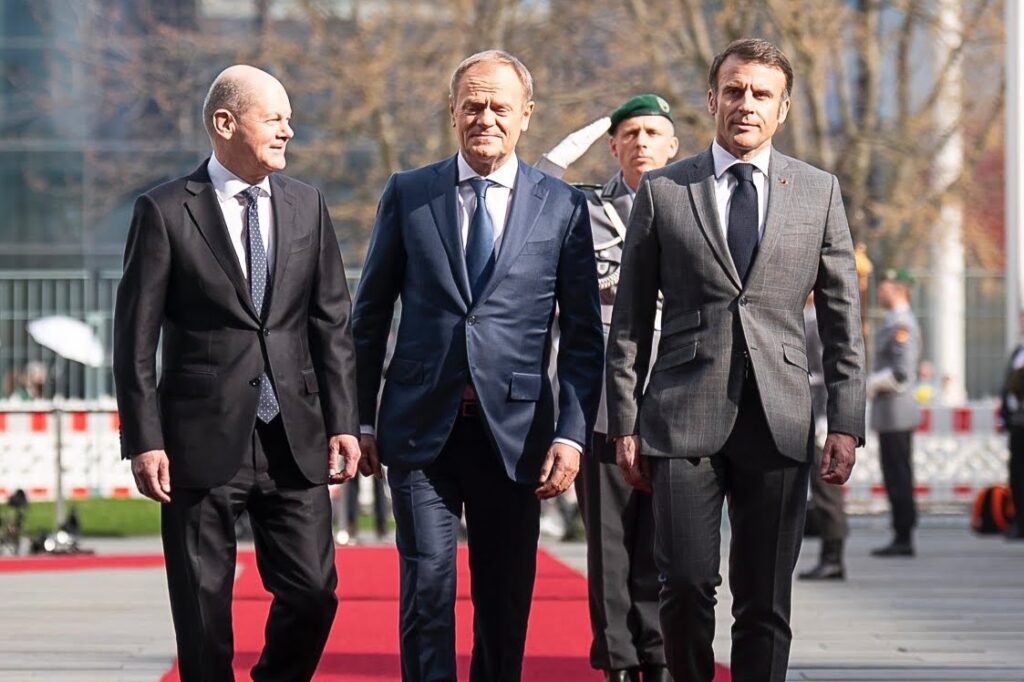France, Germany, and Poland, known as the Weimar Triangle, have expressed their concern regarding voting irregularities in Georgia’s elections, noting that they cannot support the start of EU accession negotiations unless Georgian Dream’s controversial foreign agent and anti-queer laws are repealed.
On Thursday, Weimar Triangle leaders French President Emmanuel Macron, German Chancellor Olaf Scholz, and Polish Prime Minister Donald Tusk issued a joint statement on Georgia's post-election situation.
In the statement, the leaders of the three EU countries expressed their 'grave concern' over violations observed in Georgia's recent parliamentary elections and called on Georgian authorities to investigate these irregularities, while also noting that the violations had ‘negatively affected public trust in the process’.
Citing preliminary conclusions from the International Election Observation Mission (IEOM), the leaders emphasised their intention to ‘carefully examine’ the mission’s final report.
The IEOM for this year’s parliamentary vote in Georgia consisted of a 380-strong team from the OSCE Office for Democratic Institutions and Human Rights (ODIHR), along with members of the OSCE Parliamentary Assembly and delegations from the European Parliament, the Parliamentary Assembly of the Council of Europe (PACE), and the NATO Parliamentary Assembly (NATO PA).
In their preliminary report released the day after the vote, the IEOM largely echoed allegations reported by local media and observer groups, stating that ‘reports of pressure on voters, particularly on public sector employees, remained widespread in the campaign’.
‘This, coupled with extensive tracking of voters on election day, raised concerns about the ability of some voters to cast their vote without fear of retribution’, the IEOM also stated.
[Read also: What OC Media observed during Georgia’s election]
In addition to emphasising the need for Georgian authorities to address voting irregularities, the leaders of France, Germany, and Poland also stressed in their joint statement that they ‘will not be in a position to support the opening of accession negotiations with Georgia’ unless Georgia reversed ‘its current course of action and demonstrates tangible reform efforts, particularly by repealing recent legislation that contradicts European values and principles’.
The message echoed the stance of EU Ambassador Pawel Herczynski, who, right after the European Commission released its critical enlargement progress report on Georgia, stated on 30 October that ‘due to the course of action taken by the Georgian government, EU leaders halted Georgia’s accession process. It will remain on hold as long as Georgia continues to move away from the EU’.
The reforms expected from the ruling Georgian Dream party would include amending election administration laws, which, according to the IEOM, saw no improvement before the parliamentary vote and have become even less inclusive.
As they await the IEOM’s final conclusions on the election and the response of Georgian electoral and investigative authorities to claims of election violations, EU authorities have continued to criticise the Georgian government’s pre-election actions, notably referencing the foreign agent law, anti-queer legislation, and Georgian Dream’s expressed intentions to ban key opposition groups in Georgia.
Also on 30 October, the EU's High Representative for Foreign Affairs, Josep Borrell, told media that the EU was ‘offering a clear path for re-engagement on the way to the European Union’.
‘The repeal of the law on foreign influence, which has a chilling effect on civil society and media organisations, and of the law on the so-called “family values” — because discrimination is not a value in our European Union family — these would be first signs of concrete commitment from the Georgian leadership’.
Speaking to the media on Friday, Georgian Prime Minister Irakli Kobakhidze doubled down against what he termed ‘LGBT propaganda’ among minors and stated that it was unacceptable that ‘European leaders are assuring us that a woman is not a woman and a man is not a man.’
Kobakhidze also criticised some EU member countries for allowing legal gender recognition, calling it ‘unhealthy’ and comparing transgender people to animals.
‘Tomorrow I can imagine myself, for example, as some kind of animal, so why shouldn’t I be able to register myself as one?! Or why shouldn’t my registration as a human be cancelled, right?!’.




 8 November 2024
8 November 2024



